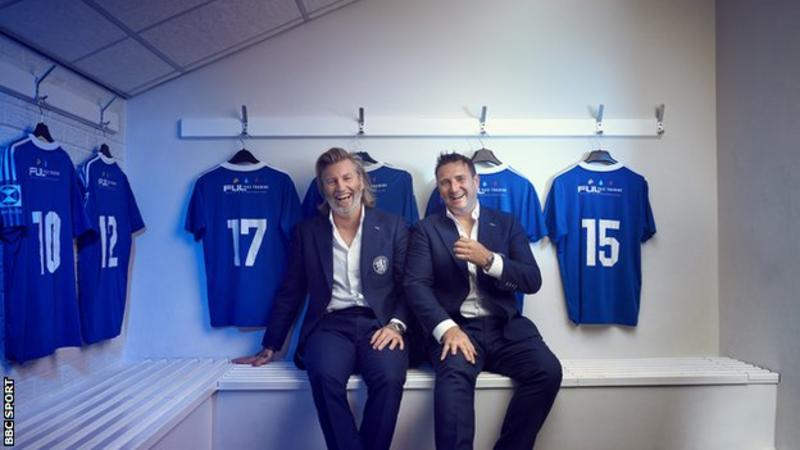- Home
- News
- What’s On
- Activities for Children
- Arts & Crafts
- Autos and Bikes
- Business events
- Car Boot & Auctions
- Charity events
- Churches & Religious
- Comedy
- Dance
- Days out & Local interest
- Education
- Exhibition
- Film
- Gardening & Horticulture
- Health
- Markets & Fairs
- Music
- Nature & Environment
- Spiritual
- Sport
- Talks and Discussions
- Theatre and Drama
- Business
- Local Information
- Jobs
- Deaths
- Charity events
- Contact Us
Frightening costs of running a football club

Director of football operations at Macclesfield FC, Robbie Savage, talks about the astronomical costs of running a football club today.
The costs of running a football club in the English pyramid, even down in the seventh tier, are absolutely frightening – it’s no surprise we’re on the verge of an independent football regulator
It’s 34 years since Michael Knighton tried to buy Manchester United for £20million and played keepy-uppy in front of the Stretford end.
But in 2023, the sobering truth is that £20m is barely loose change in English football, probably just enough if you want to run a successful Northern Premier League club for a finite period of time.
Since I became director of football operations at Macclesfield, I’ve had to open my eyes to the frightening costs of running a football club. Even in the seventh tier of the English game’s pyramid, we need to come up with £2.4million a year just to open the doors and fulfil our fixtures.

So when you read about Scunthorpe chairman, David Hilton, withdrawing funding to keep the Iron going, or Southend needing to pay an outstanding tax bill to avoid being wound up in the High Court next week, or clubs being docked points for failing to pay wages on time, don’t imagine those problems can be solved by a whip-round. And now Sheffield Wednesday owner, Djphon Chansiri, has pledged to stop putting “additional money” into the coffers at Hillsborough.
To run a football club now, you need to be a multi-multi-millionaire.
And I can understand why so many people think it’s time the game was run by an independent regulator – because too many jobs, too many livelihoods, too many communities are in danger of being destroyed by bills that clubs can’t afford to pay.
My business partner Rob Smethurst and I run Macclesfield on a transparent basis, so let’s put some cards on the table.
Our squad wage bill this season is one of the highest in our division, and on social media people sneer that we are trying to buy a third consecutive promotion – but it’s only 20 per cent of the total cost of running the club.
On top of the playing budget, we employ 85 staff at the club in coaching, administration, catering and the gym, plus matchday stewards and security. We could run a more skeleton operation, but three years ago the town didn’t even have a football club – Rob has worked his socks off to give the people of Macclesfield their sporting hub back, and we’ve chosen to be major employers in the town.
At our level, cash-flow is king. If a game is moved from 3pm on a Saturday to midweek, we brace ourselves to take a hit financially. Normally it means fewer people coming through the turnstiles because kids are at school, so income of food and drink is down, corporate sales are down and other incidental sales like programmes and merchandise are down.
But the bills still have to be paid – water, heating, floodlights, stewards, matchday bar staff – and it’s a balancing act.
If you’re successful and get promoted, as we have been for the last two seasons, the rewards are tangible but we still got hammered by some fans for putting ticket prices up and increasing the price of a pint because the brewers charged us more for a keg.
At Macclesfield, 55 per cent of our income is from non-football operations. That’s our lifeblood. Our 3G pitch is a huge community asset and a vital revenue stream. I believe 3G pitches should be allowed in the EFL because they would raise millions for hard-up clubs. They play on 3G surfaces in Scotland, so why not south of the border?
We could cut the playing budget, but if that makes us less competitive on the pitch, attendances would drop off, sponsorship would drop off and then you’re on the slippery slope. Rob has been a diligent and transparent owner, but he bought Macclesfield FC off real estate company Rightmove. He didn’t have to go through any fit and proper owners tests.
What I can’t understand is clubs getting into deep water after being sold to owners who fail to run them properly. Earlier this week, we even had the Prime Minister and a group of MPs piping up about Reading’s multiple points deductions because the players’ wages haven’t been paid on time.
It’s a desperate state of affairs for a club with a world-class training ground, a modern stadium and a fanbase who were watching Premier League football a decade ago. The young players who are fighting to win three points every week don’t deserve to have those points taken away.
I don’t know the background to what’s gone on at Scunthorpe, but it’s heartbreaking for a community that, in the short term, they may be ground-sharing with Gainsborough 17 miles away, and I hope the saga at Southend has a happy ending.
To prevent some of these scenarios where players and staff wonder if they will be able to pay the mortgage or household bills every month, the Government appears to be serious about appointing an independent football regulator. If it happens, it will be the biggest single development in English football since the Bosman rule on free transfers.
Now I know, from personal experience, about the day-to-day costs of running a football club, we can’t carry on with whole clubs communities wondering if their club will continue to exist from one month to the next.
If Michael Knighton wanted to buy Manchester United tomorrow, he would need roughly 400 times the £20m he was offering in 1989. That’s how deep your pockets need to be in 2023 if you want to own a football club.
Source: https://www.mirror.co.uk/sport/football/news/robbie-savage-macclesfield-ownership-football-31067821

You must be logged in to post a comment Login